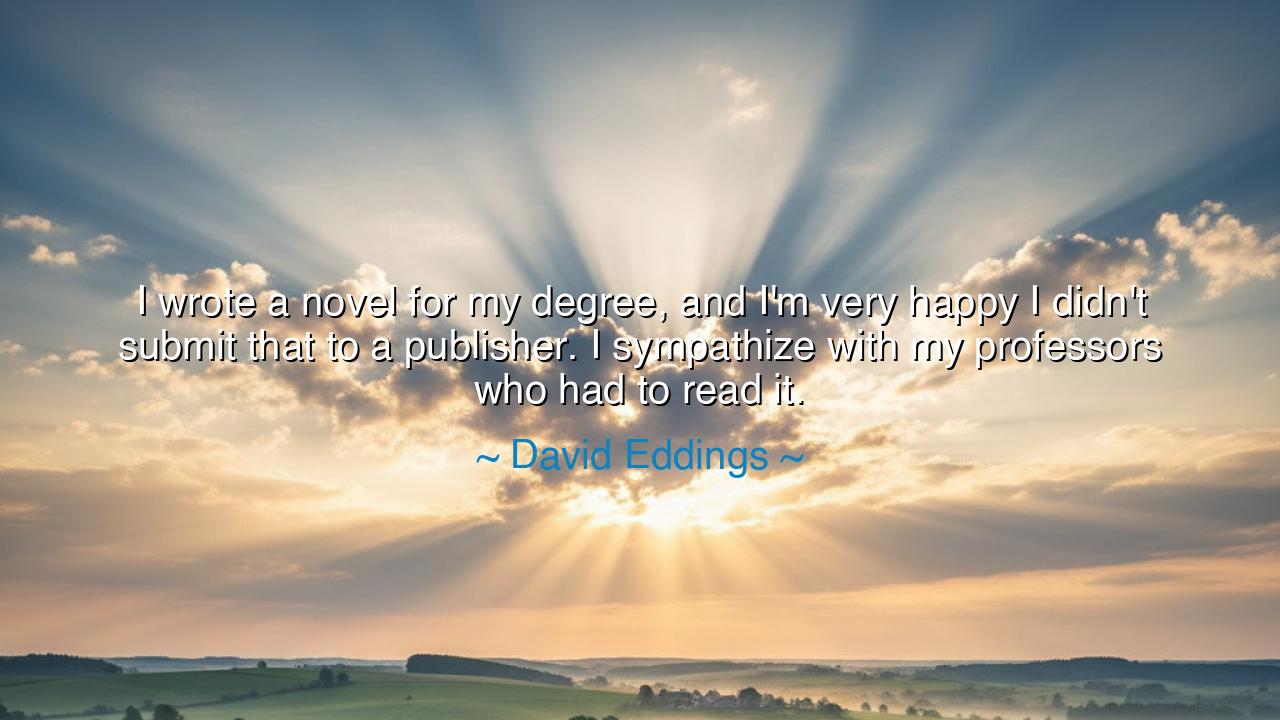
I wrote a novel for my degree, and I'm very happy I didn't submit
I wrote a novel for my degree, and I'm very happy I didn't submit that to a publisher. I sympathize with my professors who had to read it.






The words of David Eddings — “I wrote a novel for my degree, and I'm very happy I didn't submit that to a publisher. I sympathize with my professors who had to read it.” — are humble, humorous, and yet deeply profound. Beneath their self-deprecating tone lies a timeless truth about growth, mastery, and the long road of creation. These words are not the confession of failure, but the recognition of process — the understanding that one’s earliest works, though imperfect, are sacred steps toward wisdom. Eddings, who would go on to become one of the most beloved fantasy authors of the twentieth century, speaks here not as a master boasting of his talent, but as a craftsman remembering his beginnings.
When David Eddings wrote his first novel, it was not the sweeping brilliance of The Belgariad or The Malloreon that the world would later know him for. It was, rather, a young man’s experiment — raw, unpolished, and filled with the earnest excess of early ambition. His light jest about pitying his professors conceals the deeper humility of a true artist: the understanding that greatness is not born fully formed, but forged through failure, refinement, and time. To laugh at one’s beginnings is to show that one has grown beyond them. It is the laughter of the seasoned soul, who knows that every master was once an apprentice fumbling in the dark.
In the wisdom of the ancients, this recognition of imperfection was the mark of true mastery. The philosopher Socrates, though revered as one of the wisest men of Greece, declared, “I know that I know nothing.” Likewise, the sculptor Michelangelo, in the twilight of his life, said, “I am still learning.” Their humility did not diminish their greatness; it completed it. So too does Eddings’ reflection echo this ancient truth: that the artist’s journey is endless, and that each stage — no matter how awkward or flawed — serves a divine purpose in shaping the soul.
There is also an origin story hidden within his words — a glimpse into the long apprenticeship that shaped his artistry. Eddings’ path was not one of instant success. He toiled for years as a teacher and clerk, writing in the quiet corners of his life, refining his craft until his imagination found its true form. His early, unpublishable novel was the crucible in which his future voice was tempered. Without those first imperfect pages, there could be no Belgariad. Without the humility to see his own flaws, there could be no mastery of the intricate worlds he later built. His professors, reading his early work, unknowingly held in their hands the fragile beginnings of a writer who would one day inspire millions.
In his self-mockery, Eddings also gives us a lesson in patience. The modern world often demands instant perfection — the finished product before the process, the reward before the work. But true creation, whether in art, science, or life, requires time. It is like the slow growing of a tree: one must first bury the seed in darkness, allow it to struggle upward, and only then will it bear fruit. To rush that growth is to destroy it. Eddings’ joy in not submitting that early novel reveals his wisdom: he understood that the gift of delay, the grace of waiting, often protects the artist from premature exposure. In silence and humility, the roots deepen — and from them, true excellence rises.
We find echoes of this in the life of Leonardo da Vinci, who filled notebooks with sketches, designs, and fragments of ideas that would never see completion. Yet those rough beginnings were not wasted — they were the soil from which his later genius blossomed. The rough draft, the flawed attempt, the unseen labor — these are not failures; they are foundations. Eddings’ early novel was his own hidden notebook, his rehearsal for greatness. In laughing at it, he honors it. For it is the mark of wisdom to see one’s imperfections not as shame, but as stepping stones toward mastery.
So let this be the lesson, O seeker of excellence: revere your beginnings, even when they seem small or clumsy. Do not despise your early work, nor fear its flaws. The seed is never beautiful when buried, yet from it springs the tree that shades the world. Allow yourself to learn, to fail, to grow. Be patient with your craft and humble before your progress. The day will come when you, like David Eddings, can look back upon your early work not with regret, but with gratitude — for it was the first voice of the person you were destined to become.
In the end, Eddings’ words remind us that all greatness begins in imperfection, and all wisdom begins in humility. To laugh at one’s past work is not to diminish it, but to honor the journey it represents. For the true artist, the true thinker, the true human being knows that learning never ends — and that even the roughest page may one day give rise to worlds of wonder.






AAdministratorAdministrator
Welcome, honored guests. Please leave a comment, we will respond soon